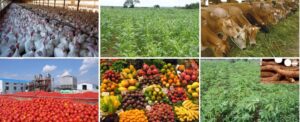Agriculture & Food Security
Agriculture is the economic backbone of our state and the nation at large. It remains a reliable and consistent sustainer of the people, having the capacity to drastically alleviate the high unemployment problem in Benue State, more than any other sector. The sustainability of our economy with inclusive growth can be achieved through the aggressive development of the agricultural sector.
However, the contribution of the agricultural sector has been on the decline over the years.
Benue State is blessed with many agricultural products like; oranges, mangoes, sweet potatoes, yams, soya-bean, cassava, beans, cocoyam, maize, rice, millet, sesame, groundnuts, palm trees, sorghum, and other fruits and vegetables.
Benue is Nigeria’s largest yam-producing state, selling over 2 million yams each year on average, and over 75% of Nigeria’s soybean production is produced in the state.
The Zaki Ibiam Yam Market is Nigeria’s largest market for a single commodity according to official records. Rice output in the state is second only to Kebbi State (1.5 million metric tons per year).
Benue and Kogi States in the north central zone of Nigeria are the largest producers of cassava in the country according to International Institute of Tropical Agriculture. Cassava’s comparative advantage compared with other food crops lies in its efficient production of cheap food energy. In addition, cassava is available all year round as well as tolerant to extreme conditions. These qualities contribute in alleviating African food crises.

Currently, Nigeria is the largest producer of cassava in the world and it is believed that production of cassava is a way farmers could easily get out of poverty since it requires less input and could grow even under harsh environmental conditions.
However, Nigeria is ranked 8th in terms of cassava yield (kg/ha). This situation could be attributed to the varieties available in Nigeria and farming practices being adopted amongst other factors. Cassava is used in many ways. It is used as a staple, for manufacturing, industrial feed, and many other forms.
For production of most traditional foods, it could be used for bread, snacks and alcoholic drinks. Cassava can be processed into garri, flour, pellets and chips. It is also a good source of animal feeds.
Despite the fact that cassava production in Nigeria is increasing at more than 3% every year, the country continues to import starch, flour, sweeteners that can be made from cassava.
The industry has significant untapped growth and development potential due to the availability of land, water, labor, and the state’s huge population, which supports internal markets. For example, the diverse and rich vegetation that can support crop and livestock population as well as the potential for irrigation.
Cassava production, tomatoes, rice and yam alone have the potential to create more than 1,000 millionaires yearly.
Considering the state’s need for competitiveness, our strategic initiatives will also involve agro-processing. Agro-processing is broadly interpreted as post – harvest processes that involve the transformation, preservation, and preparation of agricultural produce for final consumption.
Through food processing, packing, storing, transporting, grading, and distribution, the sub-sector generates job opportunities for different types of skills. In other words, the agro-processing industry is a subset of manufacturing that processes agricultural raw materials and intermediate products.
As a result, the subsector entails the transformation of agricultural, forestry, and fishery products. Processing agricultural products opens up a lot of possibilities for converting farm products into consumer goods, which saves waste and extends shelf life. As processed goods have a larger market value, this would, of course, result in value addition and increased revenue transfer to the state and farmers from various classes of consumers.

This is because agro-processing promotes a virtuous cycle of enhanced agricultural production, value-chain industrialization, and sustainable development in secondary agricultural exports, domestic job creation, and poverty alleviation. The agro-processing industry in Benue State is still grossly neglected and even forgotten.
Our initiatives will provide an integrated solution-based framework aimed at aiding farmers through low-interest credit intervention, technical assistance to improve technical abilities, the provision of subsidized warehousing, rural infrastructure, farm access roads in rural regions, agricultural research and extension services, suitable irrigation services, and regulated marketing outlets.
Mission Statement
Our goal is to reposition agriculture as a vehicle to drive industrialization and enhance food security, wealth creation, employment opportunities, poverty reduction, and economic growth.
Father Alia
Key Issues:
The national food crisis, which includes Benue State, manifests itself in increasing imports of items that our state can produce in abundance or has local equivalents for, such as tomatoes, peppers, and cassava.
Benue State has ignored the food categories in which it has a competitive edge and has grown dependent on imported food. As a result, farming and agro-allied businesses still have untapped potential.
Action Plan
-
- Empower ministries, departments and agencies to propel an independent development of the state as an agrarian society, with capacity for food security and self sufficiency
- Give priority attention to the timely supply of subsidized farm inputs, especially fertilizer and quality seeds, to farmers through the revamped Benue Agricultural and Rural Development Authority (BNARDA) in the state
- Create partnership with the federal government, private sector, and local cooperatives
- Increase the capacity of the state’s strategic grain reserves and establish public modern warehousing facilities with cold storage (for perishable farm products) where local farmers and cottage industries can store finished products and raw materials
- Evolve effective land development reforms in the state
- Collaborate with the Benue State University Center for Food Technology and Research (CEFTER) on post- harvest handling of farm produce to reduce waste.
- Promote the use of organic fertilizer
- Reactivate facilities like irrigation, storage, and agricultural service centers
- Liaise with private entrepreneurs through a Public-Private Partnership (PPP) to establish processing zones and deploy post-harvest storage facilities across the state to cater for the needs of farmers
- Revamp the Agricultural Training Institutes across Benue State to facilitate the training of agricultural manpower.
- Create an Agricultural Master Plan for Benue State
- Engage the services of agricultural and economic experts to maximize the benefits emanating from the Federal Government’s numerous agricultural schemes, like Contract Farming and the Anchor Borrowers’ Scheme
- Key into all federal government economic initiatives to facilitate the growth of agro-processing factories in the state
- Encourage the participation of NGOs and faith-based organizations in agricultural extension activities in the state
- Encourage the formation of vibrant agricultural cooperative societies in the state to help support agricultural marketing, loans, and linkage with the off-takers
- Engage in the construction of rural access roads to facilitate the evacuation of farm produce from production to marketing and consumption points
- Establish commodity marketing boards to counteract the negative market forces and middlemen syndrome that currently prevent farmers from receiving the full value of their farm products in the state
- Provide adequate funds and other necessary assistance for improved livestock farming, fisheries, and plantation agriculture
- Ensure the revival of the fisheries department under the Ministry of Agriculture, alongside all the important fishing festivals in Benue State
- Upgrade the general rural infrastructure for sustainable development
- To resuscitate state government agricultural agencies like Benue Agricultural Development Company (BADC), Benue Agricultural and Rural Development Authority (BNARDA), and Benue Tractor Hiring Agency (BENTHA) to encourage modernized agricultural practices in the stateEvolve effective agricultural land development reforms
- Set up a sizable Agricultural Intervention Fund via a low interest loan scheme. This will aid in the revival of Benue State’s underdeveloped agricultural sector. The revolving agricultural loan will be used to execute an integrated plan that includes a buy-back, allowing farmers to concentrate more on productivity.
- Modernize the agricultural sector and move our subsistence farmers to larger-scale farming by ensuring the availability of agricultural extension workers to assist our farmers, as well as the timely provision of fertilizers, chemicals, and improved seedlings to our farmers at affordable prices.
- Invest in irrigation infrastructure near rivers to guarantee that our farmers remain productive all year round, in order to preserve jobs, create wealth, and minimize rural to urban migration.
- Establish a food inspection division with the goal of enhancing market food quality, increasing nutrition, and reducing food-borne threats.
- Revive agriculture as a source of economic growth and employment creation.
- Launch a graduate-level vocational training, entrepreneurship, and skills development program, as well as a Small Business Loan Guarantee Program, to generate new jobs every year for our people.
- Using public-private partnerships, initiate and develop the Benue Green City, which will include residential and commercial facilities, hotels and conference centers, restaurants, and lake & water front amenities, taking advantage of the state’s hundreds of kilometers of rivers.
- Build orange, mango and tomato juice production and preserving industries to promote export
RURAL DEVELOPMENT
In any society, rural development is necessary and conscious efforts are made to bring about desired development for the benefit of humanity. It involves some elements and steps which should be carefully followed by the stakeholders. Many areas have remained underdeveloped as a result of the inability of the people to understand and effect development in all it dimensions.
Rural development is a concept that has been examined from a variety of perspectives. This could be due to the differences in the challenges and requirements of various rural areas.
Our rural development plan is concerned with the overall improvement of our economic, social, and political situations in terms of poverty reduction or elimination, inequality, injustice, insecurity, ecological imbalance, and unemployment in the framework of economic growth.
Mission Statement
Given the importance of the rural sector in the overall national development, it is critical that rural regions in Benue be developed, and we are committed to doing so in a timely and professional manner.
Father Alia
Key Issues
The majority of rural populations are impoverished, necessitating immediate action. Many challenges are severely affecting rural areas in Benue State, hindering the socioeconomic activities of the rural dwellers.
Other key issues include:
- Vicious cycle of poverty
- Poor rural infrastructure
- High population density
- High level of illiteracy
- Low social interaction and local politics
- Harmful traditional practices
- Lack of employment opportunities.
Action Plan
Some of the initiatives to be implemented in the 23 LGAs under our comprehensive Rural Transformation Initiative include:
- Promotion of the rural population’s social, cultural, and economic well-being
- Promotion of the sustained and orderly development of the vast resources in rural areas for the benefit of the rural people in particular and the state as a whole;
- Diversification of job opportunities and income in rural areas;
- Mobilization of the rural populace for self-help and self-sustaining development programs
- Development of technologically based industries in rural regions.
- Development of technologically based enterprises in remote regions
- Construct rural roads to help farmers transport agricultural goods and boost non-farm rural businesses
- Reposition agriculture in rural regions to drive industrialization and improve food security, job creation, employment opportunities, poverty alleviation, and economic growth
- Encourage, promote, and ensure the availability of community boreholes for a healthy lifestyle in rural areas.
Our rural development plan is concerned with the overall improvement of our economic, social, and political situations in terms of poverty reduction or elimination, inequality, injustice, insecurity, ecological imbalance, and unemployment in the framework of economic growth.
Father Alia


